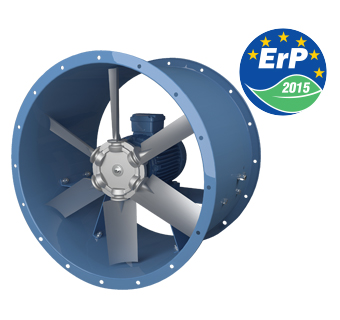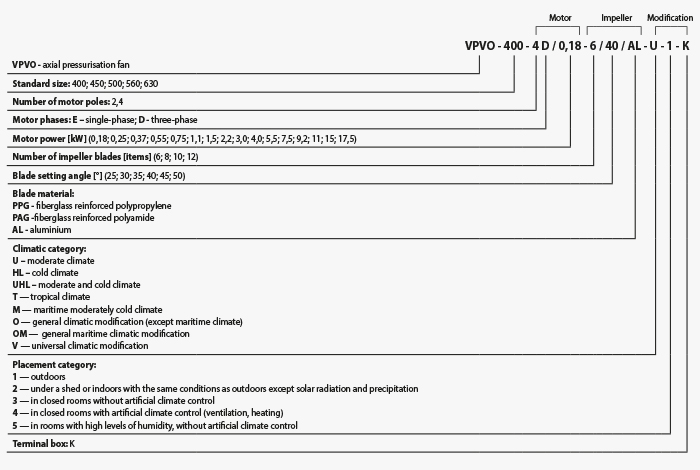
VENTS VPVO series
Medium pressure axial fans with air capacity up to 41 000 m3/h.
Purpose
The fans are used for air pressurisation in smoke extraction ventilation systems (up to 55 °C). Creating a positive air pressure differential in stairway enclosures, airlock vestibules and lift shafts helps prevent spreading of smoke and protect the people using evacuation routes from fire hazards. The fans are intended for general ventilation in systems with high air flow rate. The units are suitable for industrial, public, residential, administrative and other spaces.
Design
The metal casing with rolled flanges helps achieve outstanding rigidity and minimum clearances between the casing and the blades. There is an inspection hatch in the casing for easy maintenance. All the casing components are powder coated for improved protection against the environmental effects.
Motor
The fans are equipped with three-phase (400 V/50 Hz) single-speed 2 or 4 pole electric motors.
Impeller
Depending on the size and the required air capacity the fans are equipped with impellers with 6, 8, 10 or 12 blades angled from 25° to 50° with 5° stepping to ensure precise matching of fans with the operating point. The specially designed impeller blades ensure high efficiency of the fan while keeping noise well under control. The impellers are dynamically balanced. Low weight and low moment of the impeller inertia help reduce the fan start-up time. The fan blades can be made of the following materials:
- PPG - fiberglass reinforced polypropylene;
- PAG -fiberglass reinforced polyamide;
- AL - aluminium.
Please confirm the blade material while placing your order.
Installation
The fans can be mounted on any flat surface or directly into a ventilation duct. The units are suitable for both horizontal and vertical configurations. Induct installation requires flanges to attach the fan to the ductwork. To attach the fan to the floor, a wall or the ceiling use the O-VPVO carriers (not included as standard, should be purchased separately). The units are suitable for installation on rooftops to provide direct supply of outdoor air to the stairway areas.
Fan installation into an air duct system:
To ensure a uniform air flow the fan should be preceded by a straight duct section with a cross-section area equal to half of that of the fan. The length of the duct section should be 3 ÷ 4 D (where D is the inner diameter of the fan). The length of the straight duct section downstream of the fan should be 1.5 ÷ 2 D. Reduction of the recommended duct length values results in a drop of the fan pressure and performance. To reduce noise and vibration use the VVGF flexible joints.
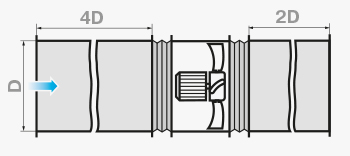
Fan installation with no upstream ducting:
Axial fans without upstream ducting must be equipped with the VK-VPVO inlet cone to improve the air flow parameters.
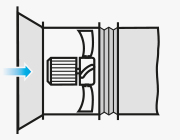
Fan installation with no downstream ducting:
If the axial fan is the terminal device of the ventilation system (i.e. there is no downstream ducting) the unit must be equipped with a diffuser to reduce the air flow velocity and the fan dynamic pressure. Reduction of the air discharge velocity results in a significant reduction of shock losses which are proportional to the square of velocity decrement.
The fan should not be equipped with a downstream contractor.
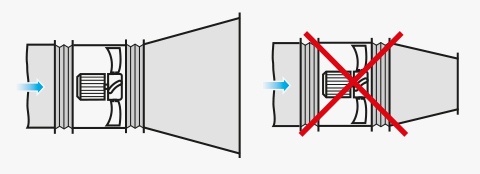
Installation near bends:
To install the fan directly downstream of a bend (elbow) use a curved section with a large bending radius or an array of internal guide vanes.

Changing diameter installation:
When changing from a smaller diameter to a larger one use a connector diffuser with the maximum opening angle of 12°.
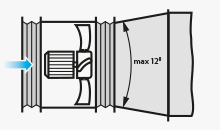
Obstructed space installation:
To ensure normal operation of the fan in an obstructed space make sure to provide for a sufficient distance between the inlet and outlet flanges and the floor, walls, bulky equipment and obstacles.
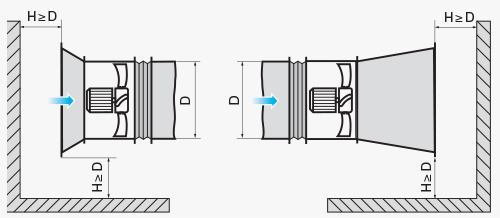
Thank your for your time and your wish to improve our site.

